CloudMounter vs ExpanDrive: Cloud-to-Cloud Showdown in 2025
CloudMounter and ExpanDrive allow you to mount your cloud storage services as network drives on your computer. To find out which app is the better one, we’ve organized this CloudMounter vs ExpanDrive contest. So read on to learn about the winner.
The best cloud-to-cloud management services typically focus on syncing between cloud storages for data backups and file transfers. However, some cloud storage managers take a different approach and work by mounting cloud services as virtual drives on your computer. In this CloudMounter vs ExpanDrive article, we’ll compare two such apps.
Key Takeaways:
- CloudMounter and ExpanDrive work by letting you mount your cloud storage services as virtual network drives.
- Thanks to its data encryption tool, CloudMounter has excellent security, plus better pricing and a vastly superior Mac free version.
- ExpanDrive has more features, is more user-friendly and has a better cloud storage selection.
- Ultimately, ExpanDrive takes home the crown, but both of these cloud storage managers have free trials and free versions, so there’s no reason why you cannot try them both out.
Both CloudMounter and ExpanDrive are great multi-cloud managers that will enable you to manage your cloud files with greater ease, speed and efficiency. They also come with free trials and free versions — CloudMounter’s generous free macOS version is especially notable here. Read on to see which app will reign supreme.
| Features | ||
|---|---|---|
| $2.50 / month(All Plans) | $99 / month(All Plans) | |
| Review | Review | |
| Free Account | ||
| Max Cloud Connections | Unlimited | Unlimited |
| WebDAV Support | ||
| FTP Support | ||
| Web Interface | ||
| Mobile Apps | ||
| Desktop Client | ||
| Upload Files | ||
| Cloud-to-Cloud Transfer | ||
| Cloud-to-Cloud Sync | ||
| Cloud-to-Cloud Backup | ||
| File Sharing | ||
| Work Spaces | ||
| Image Preview | ||
| Document Preview | ||
| Stream Media | ||
| Open File in Original Service | ||
| Search Files | ||
| Work chat | ||
| Two-Factor Authenticaion | ||
| In-Transit Encryption | ||
| End-to-End Encryption |
CloudMounter vs ExpanDrive: Setting Up a Fight
This article is divided into five important categories: features, pricing, ease of use, supported cloud services, and security and privacy. For each of these, we will compare CloudMounter against ExpanDrive to determine which one performs better in that particular area. We will award a point for each win, and at the end of this competition, we will add up the points to declare the winner.
Please note that due to this comparison isn’t as encompassing or detailed as each service’s individual reviews. So if you want to learn more about each of these multi-cloud managers, we invite you to check out our CloudMounter review and ExpanDrive review.
10,000+ Trust Our Free Cloud Storage Tips. Join Today!

- Demystify cloud storage terminology and key concepts in plain language
- Discover easy-to-implement techniques to securely backup and sync your data across devices
- Learn money-saving strategies to optimize your cloud storage costs and usage
- 1$2.50 / month(All Plans)
- 2$99 / month(All Plans)
1. Features
CloudMounter and ExpanDrive both work the same way. After you use them to connect to your cloud storage accounts, you will then be able to mount them as a virtual network drive on your computer. This is especially useful for laptops that do not have a lot of storage space. So instead of purchasing an external hard drive, you can use CloudMounter or ExpanDrive.
You can interact with every mounted network drive in the same way you would with every other drive on your computer. When you access these cloud files through Windows File Explorer or macOS Finder, the same file management options are available.
This means that you can copy, move, rename and delete these files like you normally would. Plus, any file you copy to a network drive gets uploaded to the cloud, and you have the option to download cloud files, too.

Regarding unique features, both CloudMounter and ExpanDrive have options and tools that the other one lacks. For example, CloudMounter can encrypt your cloud files, which is a tremendously useful security option. On the other hand, ExpanDrive has the search tool, which allows you to quickly sort through your cloud files and find what you are looking for even among thousands of files.
ExpanDrive has other useful additions too, including its versioning tool that lets you see previous file versions for services that support it, such as Google Drive, Dropbox and Microsoft OneDrive.
With offline sync, you can select files to work on when you don’t have internet access. When you are online again, these will sync up, similarly to how this works on Google Drive.
The bottom line: while CloudMounter’s encryption tool is both powerful and useful, it’s more of a security feature, which we will discuss it in greater detail in the “security” round below. In contrast, ExpanDrive has more features, and these are oriented more toward easier file management. For this reason, we give this first round to ExpanDrive.
2. Pricing
ExpanDrive may be the winner in the features department, but when it comes to pricing, CloudMounter offers a slightly better deal and has a superior free version. Unlike similar multi-cloud management apps that typically work on a monthly or yearly subscription model, CloudMounter and ExpanDrive function on the basis of a paid software license.
So when you purchase a license for either app, you will then be able to use it, including all of its features, on a single computer. Both CloudMounter and ExpanDrive offer volume discounts based on how many licenses you buy, so this is something you should keep in mind, especially if you are planning on using these on multiple computers.
CloudMounter Pricing
CloudMounter has different versions for Mac, Windows or Linux computers, though the Mac one is much more advanced. Considering this, we would have liked to see a slightly lower price tag for these two comparatively neglected operating systems.
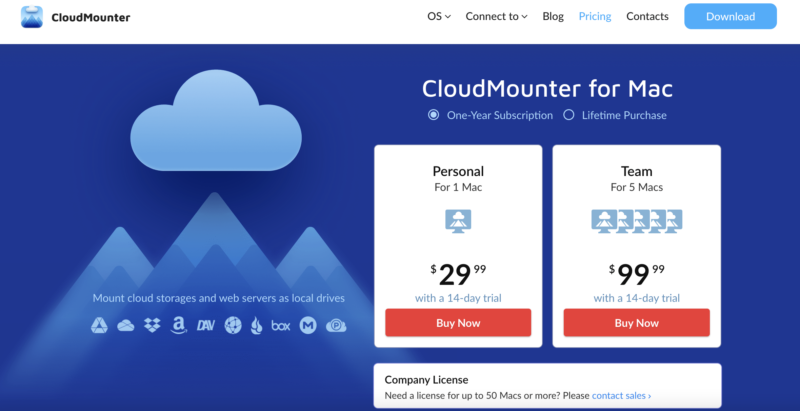
An individual CloudMounter software license (called Personal) costs $29.99 (one-year plan) and after buying it, you will be able to use CloudMounter with all of its features on one computer. The Team license costs $99.99 and covers five computers. Finally, there is the Company license that lets you install CloudMounter on 50 computers.
You also have the option of purchasing a lifetime upgrade policy. If you do not do this, you will not be able to update CloudMounter when it reaches its next major version. However, there is a sort of “grace period,” so if you bought CloudMounter a month before the next big version was released, you will get the upgrade to the new version for free.
Otherwise, if you are upgrading from an old version to the new one, you will be eligible for a 50 percent upgrade discount off the standard price. To entice customers away from their competitors, you can get a 50 percent discount to CloudMounter if you are migrating from ExpanDrive, Mountain Duck or WebDrive.
ExpanDrive Pricing
Though somewhat more expensive, ExpanDrive’s pricing is comparable to CloudMounter. An ExpanDrive Personal license costs $0, and the server edition is $99. You can purchase more licenses in the forms of packs, which range from three to 25 copies. The more licenses you buy, the greater your discount.

Same as CloudMounter, ExpanDrive gives you the option to purchase lifetime upgrades. ExpanDrive Personal lifetime plan costs , and the Server Edition lifetime plan costs .
CloudMounter & ExpanDrive: Free Trials and Free Versions
As we mentioned at the beginning of this article, CloudMounter and ExpanDrive both have free trials and free versions available. For ExpanDrive, you get a seven-day trial, while CloudMounter has a 15-day trial. During this trial period, you will be able to use all the advanced features, such as CloudMounter’s data encryption, without any limitations.
When the trial ends, both services give you a choice to either buy the license or continue using the limited free version. Speaking of which, the free versions of CloudMounter and ExpanDrive greatly differ from one another. ExpanDrive is the clear loser here since its free version is limited to 20 minutes per session.
CloudMounter takes a far more interesting approach — at least concerning its macOS free version. On the Mac, you will be able to have the data encryption feature for the first Google Drive, OneDrive and Dropbox account you’ve connected to it. Its Windows and Linux versions also do not limit your session time, though they do not come with data encryption.
All in all, this is one area where there is no doubt which is the better app. CloudMounter not only has better prices but offers a lengthier free trial and has a much better free version. If you are a Mac user looking to manage your personal cloud storage accounts for free, we’d recommend CloudMounter over ExpanDrive for that reason alone.
3. Ease of Use
The list of similarities between CloudMounter and ExpanDrive continues in this round. Since both apps function pretty much the same way, their ease of use is also comparable. However, due to it having more options for smoother file management, we once again need to rule in favor of ExpanDrive.
Both apps are really simple and straightforward to use. While other cloud storage managers such as MultCloud and cloudHQ are also very easy to make sense of, their cloud-to-cloud sync and backup features do take a bit of fiddling to set up. Since CloudMounter and ExpanDrive do not have these features, they are some of the most uncomplicated apps you can use.
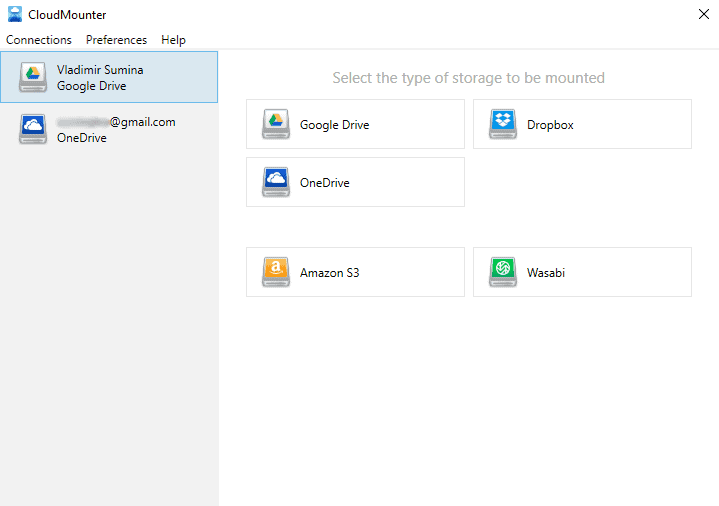
Unlike CloudMounter, ExpanDrive gives you the option to create new folders and upload files directly in the app itself, while CloudMounter only lets you do so in the virtual drive. You can also download files to your hard drive, create shareable links and preview PDFs, text files and video files in the app. Because of this, ExpanDrive takes another win over CloudMounter.
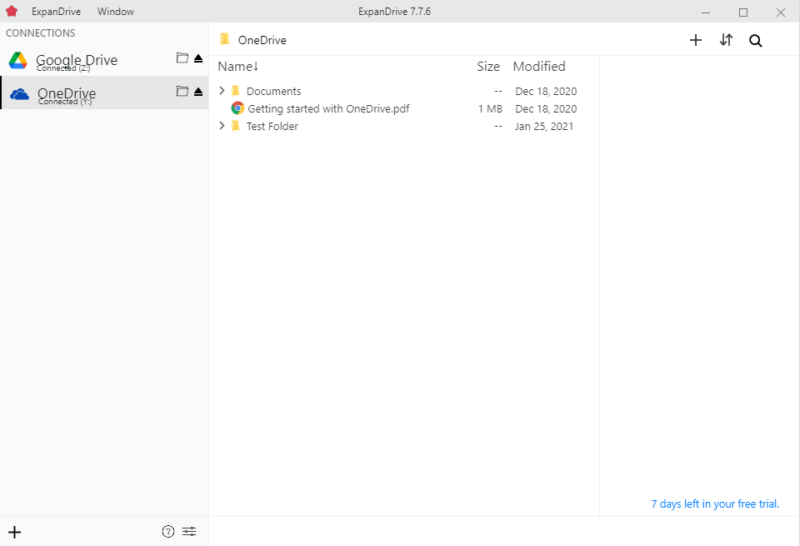
4. Supported Cloud Services
Unlike the previous category, things are not so cut and dry regarding CloudMounter and ExpanDrive’s list of supported cloud services and file transfer protocols. CloudMounter has a number of prominent services it can connect to, several of which ExpanDrive lacks, but this is on the macOS version. CloudMounter’s Windows and Linux versions support a mere handful.
On the other hand, ExpanDrive’s support list is consistent across all of its platforms, and it has more file transfer protocols as well. If CloudMounter was the same on every OS, this fight would be a lot more even, but as it stands now, we have to acknowledge that ExpanDrive has a slight advantage over CloudMounter in this aspect and award it another point.
Supported Apps
Let’s see what both apps support. Of course, it should almost go without saying that both CloudMounter (and all of its versions) and ExpanDrive support the ubiquitous triad consisting of Google Drive, OneDrive and Dropbox. Likewise, all versions also come with support for the highly popular IaaS service, Amazon S3.
Apart from these four, CloudMounter’s Windows version supports just one more cloud storage, Wasabi, though ExpanDrive can also connect to this cloud service. The Mac version has a much broader selection, and through it, you can connect to some of the best cloud storage services, such as pCloud and MEGA.nz.
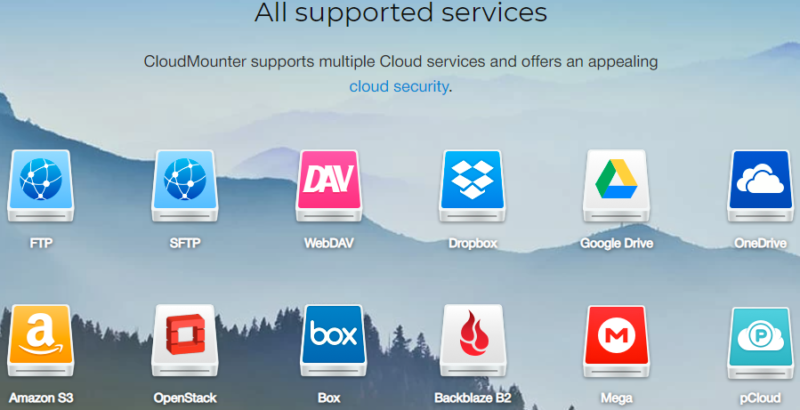
Both services support FTP, SFTP and WebDAV, all of which are great file transfer protocols, though ExpanDrive supports SMB, too.
As for ExpanDrive, it supports 20 cloud storages and transfer protocols. There is a degree of overlap with CloudMounter, but ExpanDrive connects to some of the best cloud computing services, including Microsoft Azure, Amazon S3, Google Cloud and Backblaze B2. The number one best personal cloud storage, Nextcloud, is also on the list.
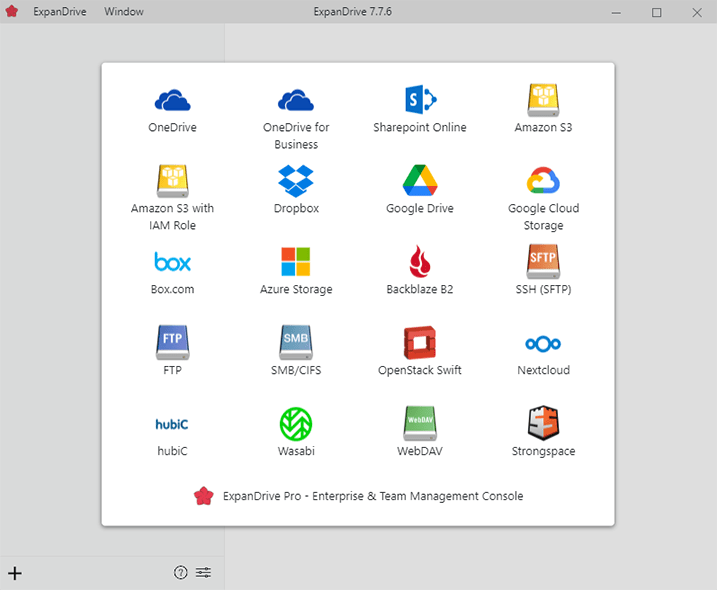
Even though CloudMounter has a more-than-adequate list of cloud services and transfer protocols it supports, due to the major differences between its versions, this round goes to ExpanDrive. ExpanDrive is particularly useful if you want to use some of its many IaaS services or file transfer protocols such as WebDAV.
5. Security & Privacy
Security is another no-brainer category that has an obvious winner. CloudMounter’s ability to encrypt cloud files gives it a distinct advantage over ExpanDrive. In most other regards, including the handling of privacy policies, CloudMounter and ExpanDrive function very similarly.
Without a doubt, one of CloudMounter’s biggest advantages is its encryption feature. Using the AES 256-bit encryption algorithm, the cloud files you’ve encrypted can be accessed only through your copy of CloudMounter.
If anyone does manage to get a hold of these files, they will not only be unable to decrypt them, but these files will also have their names scrambled, giving you complete security and privacy.
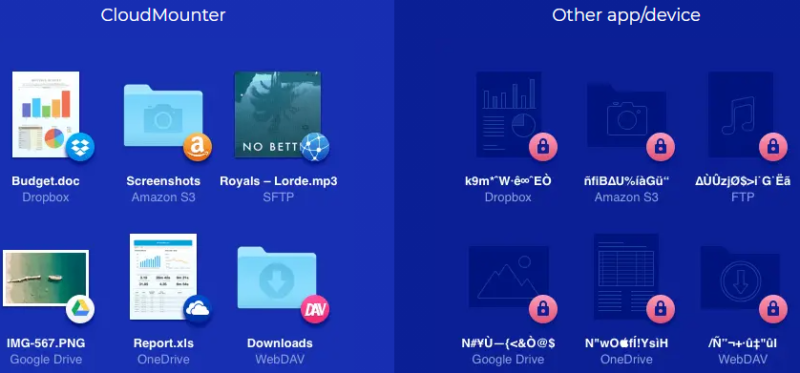
Encrypted files will not appear scrambled in your virtual drive. One thing that you also have to consider is that, by using this method, only you have access to these files, and if you lose your decryption key, you will never again be able to decrypt them. To ensure this doesn’t happen, we recommend you set up a strong password paired with a great password manager.
ExpanDrive does not use AES encryption and uses the TLS transfer protocol for data in transit. However, both multi-cloud management apps use OAuth to connect with services that support it, such as Google Drive, and neither has access to your cloud storage login information. This data is instead stored in the macOS Keychain and Windows credential vault.
CloudMounter Against ExpanDrive: Which One Has the Better Privacy Policy?
CloudMounter and ExpanDrive have similar privacy policies. They do not store your storage credentials and retain only basic personal information, such as your name and email. Though, thanks to CloudMounter’s encryption tool and the fact that it isn’t based in the United States and doesn’t have to comply with its cloud laws, gives it another advantage over ExpanDrive.
When you take everything into account, CloudMounter outclasses ExpanDrive in every way possible concerning security features and overall privacy. However, this isn’t to say that ExpanDrive has bad security or anti-user privacy. It’s just that very few multi-cloud managers offer encryption on the same level as CloudMounter does.
The Verdict
The final score: ExpanDrive three, CloudMounter two. Unlike some of our other comparison articles such as the MultCloud vs odrive match, this was a thrilling competition between two nearly equal products. That said, ExpanDrive has won the most rounds, and we hereby proclaim it the victor.
Winner: ExpanDrive
Overall, CloudMounter excels in security and has superior pricing, but ExpanDrive is more feature-rich on all platforms, is easier to use and has a more consistent list of supported cloud storage services and file transfer protocols. However, CloudMounter’s free Mac version is so good that we’d wholeheartedly recommend it to every Mac personal user.
We hope that this CloudMounter vs ExpanDrive article has helped you decide which of these two multi-cloud management apps is best suited for you and your personal preferences and professional needs. Are you a CloudMounter or ExpanDrive user? What is your opinion on them? Which do you prefer? Tell us in the comments below. As always, thank you for reading.
FAQ
CloudMounter is a multi-cloud management service that enables you to mount your cloud storage services as virtual cloud drives on your computer. It functions similarly to ExpanDrive in this regard. However, while ExpanDrive has more ease-of-use features, such as the search tool, CloudMounter has better security, thanks to its ability to encrypt your cloud files and folders.


